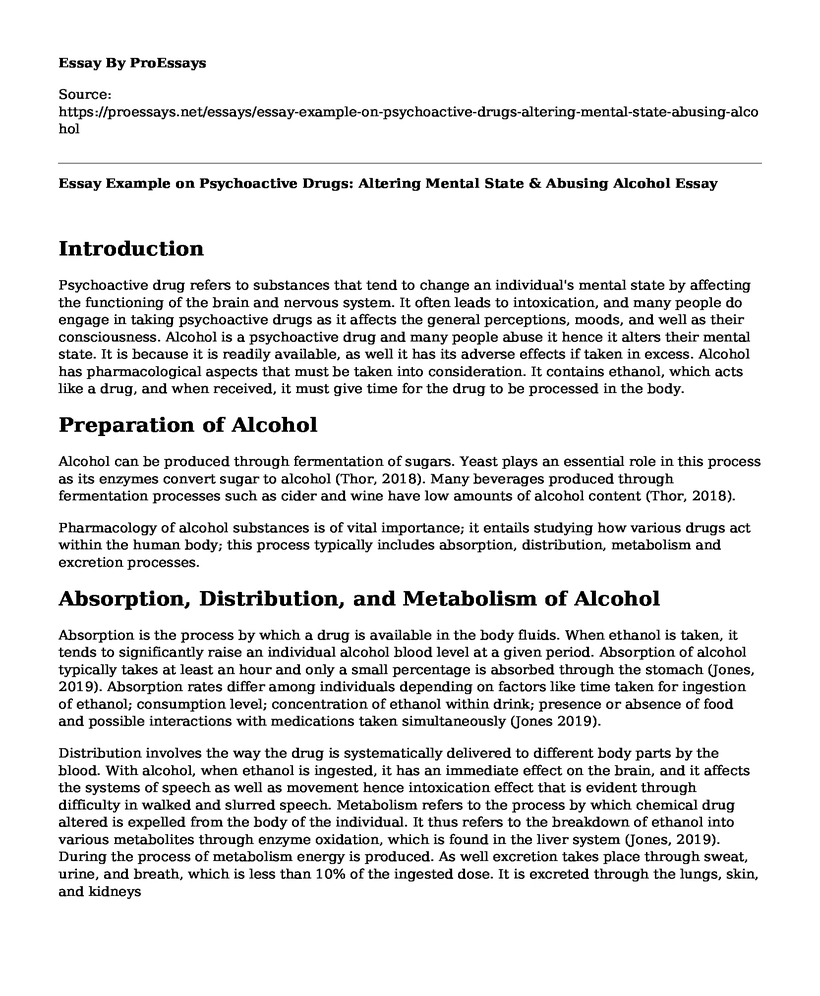Introduction
Psychoactive drug refers to substances that tend to change an individual's mental state by affecting the functioning of the brain and nervous system. It often leads to intoxication, and many people do engage in taking psychoactive drugs as it affects the general perceptions, moods, and well as their consciousness. Alcohol is a psychoactive drug and many people abuse it hence it alters their mental state. It is because it is readily available, as well it has its adverse effects if taken in excess. Alcohol has pharmacological aspects that must be taken into consideration. It contains ethanol, which acts like a drug, and when received, it must give time for the drug to be processed in the body.
Preparation of Alcohol
Alcohol can be produced through fermentation of sugars. Yeast plays an essential role in this process as its enzymes convert sugar to alcohol (Thor, 2018). Many beverages produced through fermentation processes such as cider and wine have low amounts of alcohol content (Thor, 2018).
Pharmacology of alcohol substances is of vital importance; it entails studying how various drugs act within the human body; this process typically includes absorption, distribution, metabolism and excretion processes.
Absorption, Distribution, and Metabolism of Alcohol
Absorption is the process by which a drug is available in the body fluids. When ethanol is taken, it tends to significantly raise an individual alcohol blood level at a given period. Absorption of alcohol typically takes at least an hour and only a small percentage is absorbed through the stomach (Jones, 2019). Absorption rates differ among individuals depending on factors like time taken for ingestion of ethanol; consumption level; concentration of ethanol within drink; presence or absence of food and possible interactions with medications taken simultaneously (Jones 2019).
Distribution involves the way the drug is systematically delivered to different body parts by the blood. With alcohol, when ethanol is ingested, it has an immediate effect on the brain, and it affects the systems of speech as well as movement hence intoxication effect that is evident through difficulty in walked and slurred speech. Metabolism refers to the process by which chemical drug altered is expelled from the body of the individual. It thus refers to the breakdown of ethanol into various metabolites through enzyme oxidation, which is found in the liver system (Jones, 2019). During the process of metabolism energy is produced. As well excretion takes place through sweat, urine, and breath, which is less than 10% of the ingested dose. It is excreted through the lungs, skin, and kidneys
Pharmacological Effects of Alcohol
Alcohols present in any drink tend to be biologically active; hence do possess pharmacological effects. These are effects that have an impact body cells, organs, and systems due to the use of a particular drug. Alcohol's primary effect is stimulating taste buds, increasing saliva flow and gastric juice secretion, acting as a hypnotic to relieve emotional distress and inhibit digestion; often interfering with digestion processes by creating feelings of satisfaction; therefore it has long been used as an aperitif. Another significant side effect of alcohol use is diluting blood vessels that increases circulation to skin area of individuals - potentially dangerous when in cold climate conditions as hot blood flow reduces heat loss from body.
An impact of alcohol on the central nervous system is significant as it produces mental euphoria that leads to the mistaken belief that it stimulates (Saiff, 2018). Instead, its actions affect brain cells differently, leading to depression instead. Intoxication rates depend on weight, stomach content and level of consumption - it varies according to each person's specific circumstances. The impact on the nervous system is very diverse and complicated. The primary effect is on the cell membrane that occurs immediately after absorption, whereby the motor function is depressed and leads to overall depression of the nervous system.
Conclusion
Alcohol is an example of a psychoactive substance that is commonly encountered in forensic casework due to high cases of heavy drinking that tend to be directly related to crimes as well as deviant behavior. People have a different reaction to the same dose of alcohol, which is a result of genetic, environmental factors, and cultural factors as they show the drinking habits of an individual in society. The concentration of ethanol in blood reaching the brain causes dysfunction of the body. Overconsumption of alcohol causes many incidences of unnatural deaths, acute poisoning cases, and damage to body tissues after a certain period. Hence some people regard alcohol as a drug, whereas others recognize that it's a dangerous substance.
References
Jones, A. (2019). Alcohol, its absorption, distribution, metabolism, and excretion in the body and pharmacokinetic calculations. Wiley Interdisciplinary Reviews: Forensic Science, 1(5). doi: 10.1002/wfs2.1340
Saiff, E. (2018). Pharmacological Effects of Ethanol on the Nervous System. Journal Of Studies On Alcohol, 58(4), 445-446. doi: 10.15288/jsa.1997.58.445
Thor, D., Weisman, M., & Boshka, S. (2018). Preparation of Alcohol Solutions for Behavioral Research. Quarterly Journal Of Studies On Alcohol, 28(2), 342-345. doi: 10.15288/qjsa.1967.28.342
Cite this page
Essay Example on Psychoactive Drugs: Altering Mental State & Abusing Alcohol. (2023, Jul 02). Retrieved from https://proessays.net/essays/essay-example-on-psychoactive-drugs-altering-mental-state-abusing-alcohol
If you are the original author of this essay and no longer wish to have it published on the ProEssays website, please click below to request its removal:
- Alcoholics Anonymous and Twelve Step Programs Essay
- No One Leaves Home Unless Home is A Mouth of a Shark: Paper Example on Immigration
- Research Paper on Drug Addiction
- The Cause of Poverty and the Idea of Dead Capital Essay
- Essay Example on Human Trafficking: Definition, Palermo Protocol, & Exploitation
- Essay Example on Immigration: Pros and Cons in the Modern World
- Terrorism's Impact on Nigeria: Boko Haram's Reign of Terror - Essay Sample







